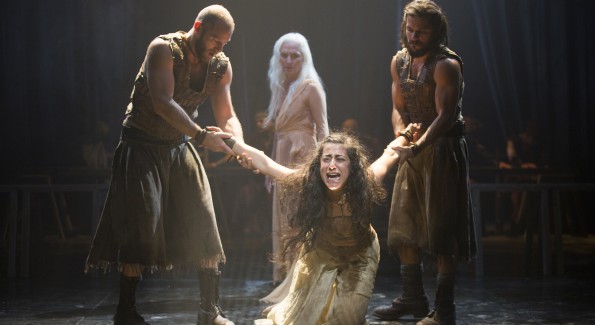Forget everything you think you know about the biblical figure for Shakespeare Theatre’s ‘Salome.’

Foreground, from left: Elan Zafir as Abaddon, Nadine Malouf as Salomé, and Shahar Isaac as Bar Giora, with Olwen Fouéré, background, as Nameless Woman in Yaël Farber’s Salomé at the Shakespeare Theatre Company. (Photo by Scott Suchman)
At the beginning of Yael Farber’s “Salome” at Shakespeare’s Lansburgh Theatre when the 12 actors wait like statues in the wings and then walk at a stiff, measured pace to their positions on the virtually empty stage, it becomes immediately obvious that Farber has created a hauntingly special drama.
Produced as part of the Women’s Voices Theater Festival, this “Salome” is like nothing we think we know about the brief biblical passage in which Salome is a nameless figure, or in the femme fatal creation of Oscar Wilde or the Robert Strauss opera. This “Salome” stands alone in its symbolic theatricality and may well be one of the best productions of the Women’s Voices Theater Festival.
Once the cast is in position, most of them gather behind a crude, long table on saw horses, reminiscent of a Last Supper gathering, the white haired crone, the Nameless Woman, announces in a world-weary voice that “I begin at the end.” Like a lone Greek chorus, she is the aged Salome, and is here to bring the past into the present. Olwen Fouere as the haunting, Nameless Woman is mesmerizingly emotionless. She is the guide who introduces a Salome that is politically astute.
Salome is every oppressed woman, but one who understands how to turn her victimization into what she can control. The young Salome, an intense Nadine Malouf, seeks the head of Iokanaan (John the Baptist), who under Farber’s adaptation and direction is much less the familiar religious fanatic. He is a political zealot crying out against the Roman occupation. Ramzi Choukair’s Iokanaan is still the hermit who has been subsisting on locusts and honey in the desert, but in this production, he is a revolutionary on a mission that foretells the coming struggles against the Roman occupiers.
The role of John the Baptist in more traditional productions is so annoyingly self-righteous that it is difficult to care about him losing his head and having it served up on a platter. This characterization is much different. He is the only performer on the stage shouting out in Arabic, but there is an immediate translation and his rage makes sense.
The other major difference is that when Salome asks Herod for the prophet’s head, she is doing so because she knows that he wants to die and that Herod astutely fears his execution will make him a martyr. Herod, performed with the appropriate sleaziness by Ismael Kanater, needs to get along with the Romans so he can go about his building projects. Farber’s Salome is a woman capable of being more than a sex symbol or a Sunday School lesson. She is a woman who understands that she can be a political force in a male-dominated world and if that means taking advantage of Herod’s lust for her, then so be it.
Salome runs for 90 intense minutes without interruption. Its mood is enhanced by the exotic, wailing voices of the singers Lubana Al Quntar and Tamar Ilana, and from Mark Bennett’s composition and sound design. The accompanying stylized movements and powerful voices of the performers are part of what is a mesmerizing spectacle under the movement direction of Ami Shulman.
Susan Hilferty’s scenic and costume design creates a biblical landscape of the bleak, harsh world of the early years of the first century. She uses the entire Lansburgh stage, open and mostly empty, back to the building’s cinder block wall, evoking the bleakness of Herod’s desert kingdom.
There is a genius about Farber’s “Salome” that rises to that rare status of a production that challenges and defines just how important theater can be in ways it can challenge preconceived notions and perceptions.
“Salome” continues through November 8 at the Shakespeare Theatre’s Lansburgh Theatre, 450 7th St., NW. Tickets are $44-$118 and available at 202-547-122 or online here.
